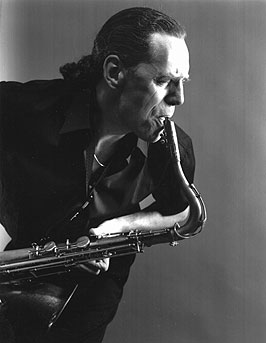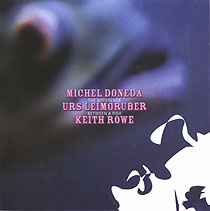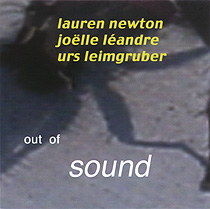

Courtesy of Urs Leimgruber

Potlatch

Leo Records
A FIRESIDE
CHAT WITH URS LEIMGRUBER
The
demands of ingenuity are cumbrous. I know women who have a rather arduous
time in deciding what they will wear daily and I know I am just as dysfunctional
when it comes to meal choices. So imagining what it is for an improviser,
in a constant state of motion, with nothing to propel that creativity,
but your own will, alas, that is a task too complex for a simpleton like
myself. But Urs Leimgruber, uber-saxophonist has been doing so for years.
Like fellow Euro reedists, Evan Parker, Hans Koch, John Butcher, Michel
Doneda, Wolfgang Fuchs, Frank Gratkowski, Luc Houtkamp, and Peter Brötzmann,
Leimgruber has been inventing and forwarding improvised music into a new
era. I caught up with Leimgruber on a recent stop during a North American
tour with Barre Phillips and the following is what we both had to say,
as always, unedited and in our own words.
FRED JUNG: Let's start from the beginning.
URS
LEIMGRUBER: The first time I heard some sounds, I tried to move my body
and I tried to improvise with my body when I was a very little child,
three years old. That was the first time I realized what sound was about
by moving my inner body. When I was six I went to a concert with my daddy
and saw a band playing and after, I was pretty sure that I wanted to start
with music and play an instrument. I wanted to play the saxophone. There
was saxophone in the band that I was seeing the concert. I thought this
instrument was too expensive to get and impossible to get because it was
a big tenor, golden tenor and next to the tenor player, there was a clarinet
player and I thought this was maybe a more easy to get because it was
in the Fifties and in Europe at that time, the saxophone was not yet so
popular and I was sure it was coming from the United States, which is
actually not right because the saxophone is a French instrument, but became
popular in jazz and jazz comes from here. Then I thought, maybe I should
start with clarinet.
FJ: Is what you play jazz?
URS
LEIMGRUBER: Yeah, there are some roots. Of course, some very important
roots in our music and it is all about improvisation and jazz discovered
improvisation. Not the first time because improvisation was already involved
in music since music exists, but in the last century, jazz has brought
improvisation back to music. From there, our music has roots, but the
form of the music does not have that much to do with jazz. It is like
contemporary music.
FJ: You also had a lengthy association with Christy Doran, Bobbi Burri,
and Fredy Study in Om.
URS
LEIMGRUBER: All the members of this group were living in the same town
in Switzerland, in Lucern and then we all met before and played before
together and we were kids, very young. I got an offer to do music for
a theater play and I asked these other musicians to do it and we did it.
After this gig, we just stayed together and we stayed together for about
ten years. Ten years is a long time and actually, Fredy, the drummer had
some other projects going on and then we talked about, first we were a
little shocked, and even tried to continue with another drummer, but we
quickly realized that it was a good idea to stop it. It was not musical
reasons. The music was still going on and doing other new steps. I think
we stopped at a very good moment that everybody continued with their own
projects and all these guys from this group are still going on today.
I think we are all sure it was a good idea to stop and not go on forever.
FJ: What is the musical climate in Europe?
URS
LEIMGRUBER: It is not completely different, but for sure, there is a bigger
public. There is more public for this kind of music, but it has also harder
times today than years before. But we have quite strong infrastructure
of education, of performing places and cultural centers which present
improvised music. There is even more and more contemporary field of music
and written music are collaborating with improvisers and the other way
around too. I think it is quite a good scene going on.
FJ: You are on tour with Jacques Demierre and Barre Phillips, whom you
recorded Wing Vane with.
URS
LEIMGRUBER: Yeah, we have been playing together since about three years,
a little more than three years. Wing Vane is the first record we did.
We also did recordings for radio, but this is the first record we did.
Barre is an incredible musician with a lot of experiences. To play with
him and also with Jacques is like communicating in a big ear, in a very
strong listening situation. That is why we also play completely acoustic.
That is musical work that is really unbelievable and rare. I think this
is a big quality of this trio.
FJ: The trio uses its share of space and silence. That goes in the face
of conventional saxophone playing, e.g. Albert Ayler or John Coltrane.
URS
LEIMGRUBER: I don't because intensity is not only to do with loud and
play loud. Intensity has also to do with to be intense and you have to
be intense during silence or playing silence or playing soft. In the completely
beginning, playing this way of playing, of course, I had some problems
even before this trio. But then, I started to develop other techniques
and tried to find ways of how I could play my horn to be in the right
balance without being not intense. I think it is a question of practice
and experience and as soon as you find out how you can do it, then it
works.
FJ: Do you prefer playing electric or acoustic?
URS
LEIMGRUBER: I prefer playing acoustic. There is no question. It became
absolutely clear the last few years and more and more, becomes more and
more important. I also integrate and work with people that use electronics.
I am also in electro-acoustic projects, but always as an acoustic instrument.
FJ: And you recorded with voice, Lauren Newton and Joëlle Léandre.
Improvising with a vocalist is a challenge.
URS
LEIMGRUBER: There is a big difference. The horn, for me, I was always
vocal orientated. When you play with somebody who uses words as an instrument,
then there is also, this is quite important, you also have to develop
your own balance to the voice because the voice has something very fragile
and with voice, you are provoked to think about your own voice and then
you have to do your work. You have to check a thousand things to be together
with the voice. It is actually hard work.
FJ: You also have a Potlatch release with Michel Doneda and Keith Rowe,
The difference between a fish.
URS
LEIMGRUBER: Yes, we fit as one instrument. I would not like to play with
another saxophone player who would like to show how good he is or how
fast he can play. This is not interesting, especially when you work with
the same instrument. It is important that the other one is making you
sound good and you do the same. That means it becomes one instrument and
then it makes sense. Especially this recording with Michel, when you don't
see the group playing, it is really hard to hear these two horns separately.
It is like one instrument and that is actually the idea. Otherwise I wouldn't
like to do it.
FJ: And the future?
URS
LEIMGRUBER: There is a recording coming out with project I have done for
a few years with a saxophone quartet and it is classical, modern classical
quartet, but they are also able to improvise. There is a project together
with Gunter Müller. He is doing electronics and he made a remix of
music which exists already together with this quartet and he brings it
in a new composition I was writing. This project was already presented
and recorded. This is a new record which comes out in the fall. I am not
so doing a lot of recordings. I am more concentrated on the few recordings.
I like to tour. I like to work with musicians. If somebody wants to record,
I am ready, especially if the concert is recorded live and the concert
was good. But to go in the situation to record, there must be a big reason
for me to record, more like document a particular time or situation. If
there is no musical reason for it, then I don't want to do it. I think
in improvised music, the real time situation is very important. That doesn't
mean you have to record all the time, except it is recorded by chance
by radio or someone. I don't want to plan it because it is a philosophical
question and I don't want to plan it.
Fred Jung is the Editor-In-Chief and is Wang Chunging tonight. Comments?
Email Him